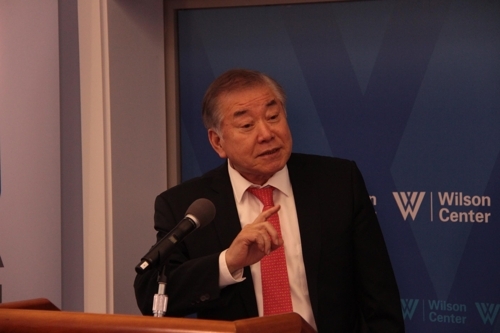WASHINGTON -- South Korea may consult with the United States about scaling back joint military exercises, such as downsizing the deployment of American strategic assets, if North Korea suspends nuclear and missile activities, an adviser to President Moon Jae-in said Friday.
Moon Chung-in, a foreign affairs scholar and special presidential adviser, made the remark during a Wilson Center seminar in Washington, saying President Moon has proposed the idea as part of an incremental solution to the nuclear standoff beginning with a freeze of the weapons programs.
 |
Moon Chung-in, special presidential adviser for unification, foreign and security affairs. (Yonhap) |
"He proposed two things. One, if North Korea suspends its nuclear and missile activities, then we may consult with the United States to (on) scaling down ROK-US joint exercises and training. I think what he has in mind is we may scale down deployment of American strategic weapons over the Korean Peninsula," the adviser said.
"Another one is linking North Korea's denuclearization to creation of a peace regime on the Korean Peninsula. It is a much more complicated one. It could be much more complicated than the Iranian deal, but anyhow, he laid out those two guidelines to which he would pursue the denuclearization of North Korea," he said.
The adviser later told reporters that US strategic assets, such as aircraft carriers and nuclear-powered submarines, began participating in joint exercises only since several years ago, and scaling back their participation could help reduce tensions with the North.
Chances are low for the North to accept the proposal, but it's still worth a try, he said.
"What's important is to reduce tensions," he said.
President Moon's idea is to seek an "incremental, comprehensive, and fundamental solution" to North Korean problem as he believes "ultimate denuclearization of North Korea will take much longer period, longer time, most likely not during his tenure if he understands the realistic constraints," the adviser said.
The offer to downsize joint exercises could be attractive to North Korea as Pyongyang has long denounced such maneuvers as a rehearsal to invade the country and demanded an immediate halt to them. It is unclear, however, how the US would react to the idea because Washington has flatly rejected the North's demand, saying such drills are purely defensive.
But the adviser said he believes the US would see little problem with downsizing strategic assets deployment.
The adviser also said that the environmental assessment that South Korea plans to conduct over the US THAAD missile defense system could take one year because the study should take into consideration the deployment's impact over four seasons.
Earlier this month, South Korea suspended the deployment of an additional four THAAD launchers pending an environmental assessment, spurring doubts the halt might be a precursor to the South ultimately rejecting the THAAD deployment altogether. But Seoul has promised that the environmental review won't lead to a reversal on the deployment itself.
Adviser Moon said that it's wrong to say the alliance could break up over THAAD.
"THAAD is a weapons system, defensive weapons system. Does the alliance break up because of that?" he said. "It's hard to accept to say as if THAAD is everything about the alliance," he said.
Adviser Moon, an honorary professor at Seoul's Yonsei University, arrived in Washington earlier this week on a mission to improve understanding among American opinion leaders of the new government's foreign affairs and inter-Korean policy ahead of the summit between the two countries.
North Korea is expected be one of the top issues for Moon's June 29-30 meetings with US President Donald Trump, with a focus on how to reconcile Trump's policy of "maximum pressure" on the North with Moon's hopes to foster peace through exchanges and cooperation with the isolated neighbor.
The adviser said that President Moon plans to seek greater exchanges and cooperation with North Korea within the framework of international sanctions on Pyongyang, a remark seen as aimed at dispelling US concerns that a softer approach by the South's new liberal leader could end up blunting sanctions on Pyongyang.
The South seeks a peaceful coexistence or "de-facto unification" with the North through trust-building and exchanges and cooperation and won't seek to absorb the North, the adviser said. The new government will also not tolerate the North's provocations, he said.
The South should seek dialogue with the North if the North refrains from provocations, the adviser said.
"Is there any reason for us not to have a dialogue when North Korea refrains from provocations?" he said. "The point is to improve inter-Korean relations. It's pretty clear that if the inter-Korean relations improved, it would have a positive effect on the missile and nuclear issues."
The Moon administration also hopes to further strengthen the alliance with the US and take back the wartime operational control of the country's forces from the US in order to reduce its dependence on the US for its security and to enhance its defense capabilities, the adviser said.
But he said the OPCON issue is not expected to be a topic for the upcoming summit. (Yonhap)







![[Today’s K-pop] Blackpink’s Jennie, Lisa invited to Coachella as solo acts](http://res.heraldm.com/phpwas/restmb_idxmake.php?idx=644&simg=/content/image/2024/11/21/20241121050099_0.jpg)
